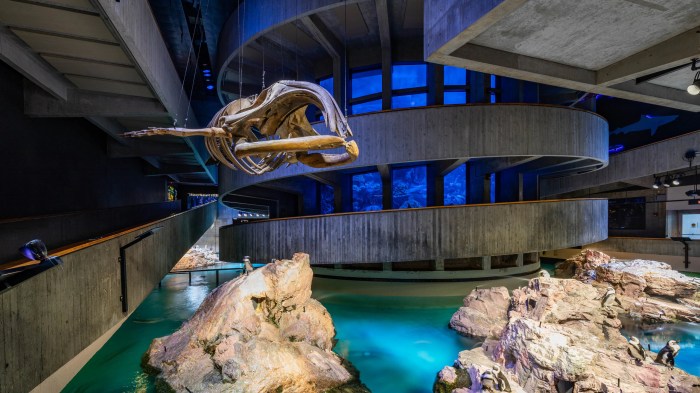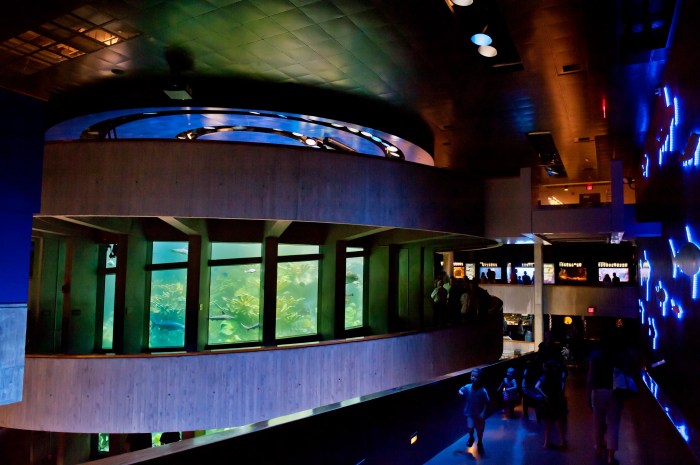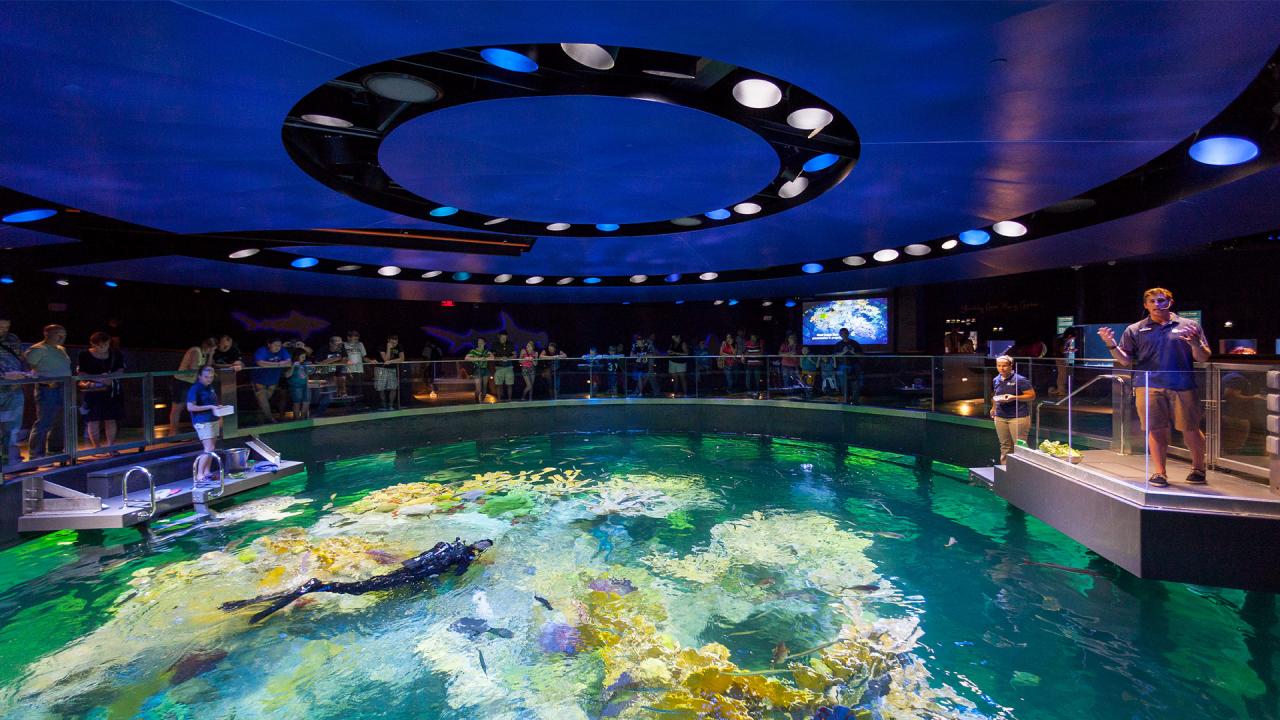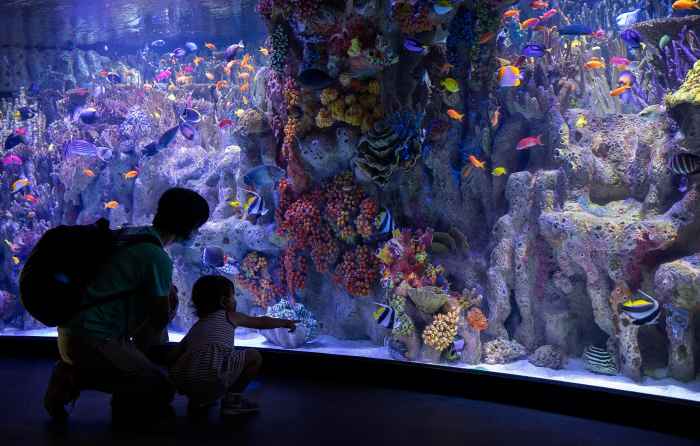Welcome to Aquarium Boston, a captivating underwater oasis where the wonders of the ocean come to life. Immerse yourself in a realm of diverse marine ecosystems, encounter fascinating creatures, and embark on an unforgettable journey of discovery and conservation.
From awe-inspiring sharks and graceful sea turtles to playful penguins and vibrant coral reefs, Aquarium Boston offers a kaleidoscope of marine wonders that will ignite your curiosity and inspire your imagination.
Aquarium History
The New England Aquarium was founded in 1969 as a non-profit organization dedicated to promoting public understanding of marine science and conservation. Its mission is to inspire and educate visitors about the importance of the ocean and its inhabitants.
The aquarium’s early years were marked by a series of notable events and milestones. In 1970, the aquarium opened its first permanent exhibit, a 10,000-gallon tank featuring a variety of marine life from the Gulf of Maine. In 1972, the aquarium became the first in the United States to successfully breed African penguins in captivity. And in 1976, the aquarium opened its Giant Ocean Tank, one of the largest and most comprehensive marine habitats in the world.
The New England Aquarium in Boston is a great place to learn about marine life, with exhibits on everything from sharks to penguins. After exploring the aquarium, you may want to relax at one of the many luxury beach resorts in the area.
The Boston Harbor Hotel is a great option, with its stunning views of the harbor and its luxurious amenities. The Seaport Hotel is another great choice, with its convenient location and its modern design. No matter which resort you choose, you’re sure to have a relaxing and enjoyable stay.
Expansion and Renovations
Over the years, the New England Aquarium has undergone several major expansions and renovations. In 1992, the aquarium opened a new wing, the Simons Theatre, which houses a 3D theater and a variety of educational exhibits. In 2001, the aquarium completed a major renovation of its Giant Ocean Tank, which added a new viewing area and a state-of-the-art life support system.
Conservation and Education
In addition to its public exhibits, the New England Aquarium is also actively involved in conservation and education. The aquarium’s research and conservation programs focus on a variety of marine species, including sea turtles, sharks, and penguins. The aquarium also offers a variety of educational programs for students of all ages, including field trips, workshops, and summer camps.
Exhibits and Attractions
The New England Aquarium in Boston offers a diverse range of exhibits and attractions that showcase the wonders of the aquatic world. These exhibits are designed to educate and entertain visitors of all ages, providing an immersive experience into the fascinating realm of marine life.
The aquarium is organized into several distinct areas, each highlighting a specific theme or ecosystem. The centerpiece of the aquarium is the Giant Ocean Tank, a massive cylindrical tank that houses a variety of large marine animals, including sharks, rays, and sea turtles. The tank offers visitors a panoramic view of these majestic creatures as they swim and interact with each other.
Other notable exhibits include the North Atlantic Exhibit, which showcases the marine life found in the cold waters of the North Atlantic Ocean; the Tropical Reef Exhibit, which features a vibrant display of tropical fish and coral; and the Penguin Exhibit, where visitors can observe the playful antics of these flightless birds.
The New England Aquarium also offers a variety of interactive exhibits that allow visitors to engage with the animals and learn about their behavior. These exhibits include touch tanks, where visitors can interact with live sea creatures such as starfish and sea urchins; and the Discovery Center, which provides hands-on learning experiences for children.
Exhibit Layout
The New England Aquarium is laid out in a circular pattern, with the Giant Ocean Tank as the focal point. Visitors can follow a path that leads them through the various exhibits, starting with the North Atlantic Exhibit and ending with the Penguin Exhibit. Along the way, visitors will encounter a variety of interactive exhibits and educational displays.
The aquarium also offers a map to help visitors navigate the exhibits and find specific attractions. The map is available at the entrance to the aquarium and can also be downloaded from the aquarium’s website.
Marine Life Collection
The New England Aquarium in Boston, Massachusetts, boasts a diverse collection of marine life representing various ecosystems worldwide. The aquarium’s collection includes over 2,000 species, from tiny seahorses to massive sharks, providing visitors with an immersive and educational experience.
The aquarium’s collection is not merely for display but also serves as a vital resource for conservation and research efforts. The New England Aquarium actively participates in various conservation initiatives, including habitat restoration, species protection, and public education campaigns.
Scientific Classification and Descriptions
The New England Aquarium’s marine life collection is scientifically classified into different taxonomic groups, including:
- Fish: The aquarium houses a wide variety of fish species, including sharks, rays, eels, and colorful reef fish. Notable species include the sand tiger shark, green moray eel, and clownfish.
- Invertebrates: The collection includes various invertebrate species, such as jellyfish, sea urchins, and lobsters. The Giant Pacific Octopus and the North American Lobster are popular attractions.
- Marine Mammals: The aquarium is home to several marine mammal species, including harbor seals, California sea lions, and African penguins. These animals showcase their natural behaviors and engage in interactive presentations.
- Reptiles and Amphibians: The collection also includes reptiles and amphibians, such as American alligators, green anacondas, and African bullfrogs. These species represent different habitats and provide insights into their unique adaptations.
Conservation Efforts
The New England Aquarium is deeply committed to marine conservation. The aquarium’s conservation efforts include:
- Habitat Restoration: The aquarium supports coral reef restoration projects and works to protect critical marine habitats.
- Species Protection: The aquarium participates in breeding programs for endangered species, such as the North Atlantic right whale and the American eel.
- Public Education: The aquarium educates visitors about marine conservation issues and encourages responsible stewardship of our oceans.
Educational Programs and Research

The New England Aquarium is dedicated to educating the public about the importance of marine life and the conservation of our oceans. The aquarium offers a variety of educational programs for all ages, from preschoolers to adults.
The aquarium’s educational programs include:
- Guided tours of the aquarium’s exhibits
- Interactive exhibits and demonstrations
- Educational programs for schools and youth groups
- Public lectures and workshops
The aquarium also conducts a variety of research initiatives, including:
- Research on the biology and conservation of marine animals
- Research on the effects of climate change on marine ecosystems
- Research on the development of new technologies to protect marine life
The aquarium’s educational and research programs have a significant impact on the community. The aquarium’s educational programs help to increase public awareness of the importance of marine life and the conservation of our oceans. The aquarium’s research programs help to advance our understanding of marine ecosystems and the threats they face. The aquarium’s educational and research programs are essential to the conservation of our oceans and the protection of marine life.
Conservation and Sustainability

The New England Aquarium is deeply committed to conservation and sustainability, recognizing the importance of preserving the ocean and its inhabitants for future generations.
The New England Aquarium in Boston is a must-see for any luxury traveler. With its diverse collection of marine life, including sharks, penguins, and sea turtles, it’s a great way to experience the wonders of the ocean. And for those looking to make their trip even more luxurious, consider checking out our luxury travel tips to enhance your stay in Boston.
From five-star hotels to Michelin-starred restaurants, there are plenty of ways to make your trip to the New England Aquarium an unforgettable experience.
The aquarium implements a range of conservation initiatives, including research, education, and advocacy. It supports marine conservation organizations worldwide and collaborates with scientists to study and protect marine ecosystems.
Sustainability Practices
The aquarium operates with a strong emphasis on sustainability, reducing its environmental footprint through various practices:
- Energy efficiency: Using energy-efficient lighting, appliances, and systems.
- Water conservation: Implementing water-saving measures in exhibits and operations.
- Waste reduction: Minimizing waste through recycling, composting, and responsible waste management.
- Sustainable seafood: Sourcing seafood from sustainable fisheries that prioritize ocean health.
Promoting Ocean Conservation
The New England Aquarium plays a crucial role in promoting ocean conservation through:
- Public education: Engaging visitors with exhibits, programs, and resources that highlight the importance of ocean conservation.
- Advocacy: Advocating for policies that protect marine ecosystems and promote sustainable practices.
- Research: Conducting research to inform conservation strategies and advance scientific understanding of marine life.
Visitor Information
The New England Aquarium is conveniently located in the heart of Boston’s vibrant waterfront, at Central Wharf on Boston Harbor. Its prime location offers easy access for visitors from all corners of the city and beyond.
To ensure a memorable and enjoyable experience, the aquarium’s hours of operation vary seasonally. During the peak season (June-August), the aquarium is open daily from 9:00 AM to 6:00 PM. From September to May, the aquarium’s hours are slightly reduced, with daily operations from 10:00 AM to 5:00 PM. Visitors are encouraged to check the aquarium’s website for any special hours or closures before planning their visit.
Admission Prices
The New England Aquarium offers a range of admission prices to cater to different visitor needs. General admission tickets for adults (12 years and older) are priced at $33.95, while children (3-11 years) can enter for $24.95. Seniors (60 years and older) receive a discounted rate of $31.95. For families, the aquarium provides a family pass that admits two adults and two children for $99.95. Additionally, the aquarium offers discounted group rates for groups of 10 or more visitors.
The New England Aquarium in Boston is a must-visit for marine enthusiasts. With its diverse collection of marine life, including sharks, penguins, and sea turtles, it offers an unforgettable underwater experience. If you’re looking for a warm and sunny getaway after your aquarium adventure, consider visiting Agadir , a vibrant coastal city in Morocco.
With its stunning beaches, lively souks, and delicious cuisine, Agadir provides a perfect blend of relaxation and cultural immersion. And when you return to Boston, don’t forget to revisit the New England Aquarium to relive the wonders of the deep.
Accessibility Features and Amenities
The New England Aquarium is committed to providing an inclusive and accessible experience for all visitors. The aquarium features wheelchair-accessible ramps and elevators throughout the facility, ensuring that all exhibits and attractions are accessible to visitors with disabilities. Additionally, the aquarium provides assistive listening devices and closed captioning for educational programs and presentations.
For visitors with sensory sensitivities, the aquarium offers quiet zones and designated areas with reduced lighting and noise levels. The aquarium also provides sensory backpacks that include fidget toys, noise-canceling headphones, and other items to help visitors manage sensory challenges.
Tips and Recommendations for Visiting the Aquarium
To make the most of your visit to the New England Aquarium, here are a few tips and recommendations:
- Purchase tickets online: Advance ticket purchases allow you to skip the lines and guarantee entry, especially during peak season.
- Arrive early: Arriving at the aquarium when it opens ensures you have ample time to explore the exhibits and avoid crowds.
- Plan your route: The aquarium is vast, with numerous exhibits and attractions. Plan your route in advance to make the most of your time.
- Take breaks: The aquarium offers several休憩 areas and cafes where you can rest and refuel. Take advantage of these breaks to avoid fatigue.
- Engage with the staff: The aquarium staff is knowledgeable and passionate about marine life. Don’t hesitate to ask questions or seek recommendations.
- Consider a guided tour: Guided tours provide an in-depth look at the aquarium’s exhibits and collections, led by experienced educators.
- Visit during weekdays: Weekdays tend to be less crowded than weekends, offering a more relaxed and enjoyable experience.
- Check the weather: The aquarium’s outdoor exhibits may be affected by weather conditions. Check the weather forecast before your visit and dress accordingly.
Reviews and Testimonials

The New England Aquarium receives a lot of positive feedback from visitors, highlighting its educational value, diverse marine life collection, and conservation efforts. However, some negative experiences have been shared regarding occasional overcrowding, limited seating areas, and expensive admission prices.
Overall, the aquarium’s reviews and testimonials reflect a generally positive sentiment, with many visitors appreciating its contributions to marine life conservation, research, and education.
Positive Experiences
- Educational and informative exhibits that provide valuable insights into marine life and conservation.
- Impressive collection of diverse marine species, including giant ocean animals like sharks and whales.
- Commitment to conservation and sustainability, including programs to protect endangered species and reduce plastic pollution.
- Engaging and interactive experiences, such as touch tanks and behind-the-scenes tours, that offer unique opportunities to learn about marine life.
- Convenient location in the heart of Boston, making it easily accessible to visitors.
Negative Experiences, Aquarium boston
- Occasional overcrowding, especially during peak tourist seasons, which can make it difficult to navigate the exhibits comfortably.
- Limited seating areas within the aquarium, making it challenging to rest or take a break.
- Relatively expensive admission prices, which may not be affordable for all visitors.
- Long wait times for popular exhibits and attractions, particularly during weekends and holidays.
- Some visitors have expressed concerns about the size of certain animal enclosures, particularly for larger species like sharks and whales.
Concluding Remarks

As you leave Aquarium Boston, you will carry with you a newfound appreciation for the beauty and fragility of our oceans. Inspired by the aquarium’s conservation efforts, you will become an ambassador for ocean health, spreading awareness and taking action to protect the wonders you have witnessed today.
Top FAQs: Aquarium Boston
What are the hours of operation for Aquarium Boston?
Aquarium Boston is open daily from 9:00 AM to 5:00 PM.
How much does it cost to visit Aquarium Boston?
Admission prices vary depending on age and membership status. Please check the aquarium’s website for current pricing information.
Is Aquarium Boston wheelchair accessible?
Yes, Aquarium Boston is fully wheelchair accessible. Wheelchairs are available for rent on a first-come, first-served basis.